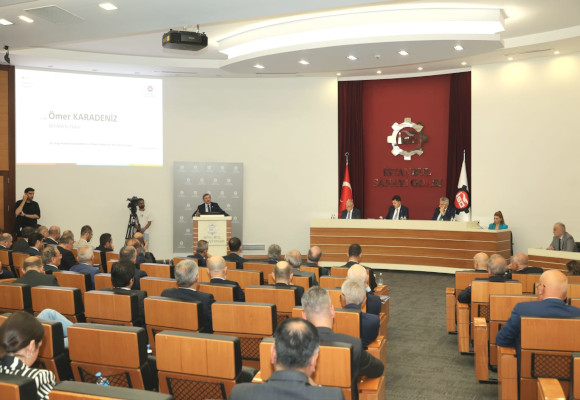
Ömer Karadeniz, the President of PLASFED, stated during his speech at the İSO June Assembly meeting that circular economy provides a strategic solution to reduce Turkey's raw material dependence in the plastic sector. Karadeniz said, “Circular economy is our strongest means to reduce foreign dependence and keep billions of dollars within the country.”
The regular June assembly meeting of the Istanbul Chamber of Industry (İSO) was held with the main agenda of “Assessing Collaboration Opportunities for Visionary and Innovative Industry Capable of Sustainable Green Development and Earthquake Safety” at the Odakule Fazıl Zobu Assembly Hall.
Hosted by İSO Board Chairman Erdal Bahçıvan, the meeting featured the participation of the Minister of Environment, Urbanization, and Climate Change Murat Kurum, along with PLASFED Chairman Ömer Karadeniz.
During the İSO June Assembly meeting, Minister of Environment, Urbanization, and Climate Change Murat Kurum drew attention to the rising tensions in the Middle East. Kurum stated, “At the moment, the geography surrounding Anatolia is turning into a veritable fire ember. In such times, the reflexes countries exhibit are critically important. We need to ensure that production and industry do not come to a standstill; our strategic facilities must be equipped with infrastructure that we can protect even in wars.”
In his opening speech at the Assembly meeting, İSO Board Chairman Erdal Bahçıvan said, “To be globally competitive, the industrial sectors must become greener, more circular, and more digital. In this era, we must rapidly transition from the model of ‘take-use-dispose’ to a circular economy that does not lead to the excessive consumption of natural resources.”
PLASFED President Ömer Karadeniz:
“We can potentially cover part of the raw material gap with circular economy.”
Speaking at the meeting attended by the Ministry of Environment, Urbanization, and Climate Change officials, industry representatives, and assembly members, Ömer Karadeniz highlighted that Turkey is heavily dependent on imports, particularly in the plastic sector, emphasizing that circular economy can play a critical role in reducing this dependence.
Karadeniz stated, “Turkey is a country poor in terms of raw materials,” noting that we import 85-90% of thermoplastics and 100% of some engineering plastics from abroad. Addressing the pressure this situation puts on the national economy, he remarked, “If we effectively implement circular economy, we can meet part of these imported raw materials domestically. Thus, we can prevent billions of dollars from leaving our country's treasury.”
Stating that the traditional “take-use-dispose” model is not sustainable, Karadeniz mentioned that this understanding has transitioned to the principles of “reduce, reuse, recycle.”
During the meeting, he also referred to the zero waste project and the Deposit Refund System (DRS), which he described as “vital for our country.” Highlighting the sluggishness experienced in the implementation, Karadeniz stated, “We have been waiting for concrete steps regarding DRS for nearly five years. Sakarya was selected as the pilot city, but this process should not be delayed any longer; it needs to be completed quickly.”
Translated by Artificial Intelligence
